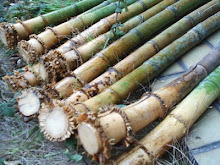Photos by Andrew Chester Ong
I have never met Okuda Sensei but I have enjoyed his music immensely. It's quite obvious that he knows how to listen and have a conversation with the raw bamboo.
When finishing a flute, I often hope that the future owner will be able to hear what I hear and feel what I feel, at least in the beginning. And as they become a true "partner" of the instrument, I hope that they will take it further beyond what I have experienced, since I only birthed them. It is this unique relationship that is quintessential in discovering the essence of the shakuhachi. Without this awareness, we are just jumping from one bed to another. Please excuse the rude analogy, but it help us think of the respect a flute deserves (it also came from a teacher of mine).
With this in mind, I humbly go back to work in deeper awe of my teachers, makers and players before me.
Namaste, Perry
